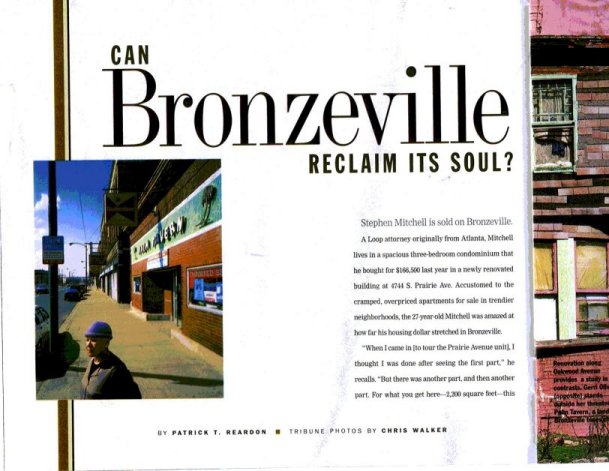
Selection from the May 21, 2000 issue of the Chicago Tribune Sunday Magazine.
See full article at:
http://www.chicagotribune.com/leisure/tribunemagazine/article/0%2C2669%2CSAV-0005210368%2CFF.html
or at:
http://palmtavern.bizland.com/palmtavern/000521_Can_Bronzeville_Reclaim_Its_Soul_full_article.htm
CAN BRONZEVILLE RECLAIM ITS SOUL?
By Patrick Reardon

Selected text:
Gerri Oliver also worries about her chances of staying in Bronzeville. Since 1956, Oliver has operated Gerri's Palm Tavern, a blues club at 446 E. 47th St. with an international reputation.
Over the decades, this was an unofficial clubhouse -- the place to stop and rest and recharge psychic batteries -- for generations of African-American musicians, including Duke Ellington, James Brown, Count Basie, Dizzy Gillespie, Quincy Jones and Muddy Waters. Tribune critic Howard Reich once wrote, "It would be difficult to overestimate the room's role in nurturing black musical culture in Chicago and beyond. This was the place where ideas were exchanged, tunes discussed and collaborations conceived."
The club has a second claim to fame: It was founded by James E. "Genial Jim" Knight, a policy king who, in 1934, was elected the First Mayor of Bronzeville.
In February, Mayor Daley issued a proclamation honoring the 80-year-old Oliver and calling her "a cultural icon." Yet, rumors abound that the club is going to be closed-ironically, to make way for the redevelopment of 47th Street as a blues district, the brainchild of Ald. Tillman.
Asked about the rumors, planning director Hill is less than reassuring, saying only "We don't have any current plans with that building right now." Even so, the city is in court, seeking ownership of the structure that contains the club.
Tillman sidesteps all questions about whether Oliver will be permitted to keep her club open once the city obtains the building. "We've got to clean that place up," she says. "Of course, we're going to place jazz in that club one way or the other." As for Oliver, Tillman has nothing to say.
Oliver says, "No one has come in and said, 'Gerri, what do you think of this?' No one has invited me into the inner circle." Community activists began working in the early 1980s to come up with ideas of how to redevelop Bronzeville and shape it as a tourist attraction by highlighting its history. In 1994, after extensive community meetings, a coalition of community groups, the Mid-South Planning and Development Commission, issued a detailed plan -- which city officials have all but ignored.
The city has said very little about its own plans for Bronzeville. Tillman's proposals for the area, which include an "African Village" and an "African Bazaar," as well as the blues district, have been light on details.
Timuel Black, having lived so long and seen so much, is often called upon to lead groups around Bronzeville, recalling its past glories.
"When I take people on a tour, " he says, "I have to point at some vacant land to talk about the Regal or the Savoy or the Metropolitan, the Binga Arcade, the Vendome, the Pythian Temple. All that's gone. You have to point to a site: 'I used to live on the second floor of that vacant lot.' The imagination can only stretch so far to help the tourists understand the richness. I can't walk up the steps of a building that isn't there. When I look at the restoration [of Bronzeville] that's taking place, so much of the physical history's been demolished." As the neighborhood's many remaining graystones and redstones are renovated and returned to something like their original elegance, they won't hark back to the overcrowded days of the Black Belt, but to the earlier time when this community was one of' wealth and privilege.
And elegance is going to be the characteristic, as well, of most of the new housing to be built.
"As the changes take place," Black says, "the image [of what Bronzeville once looked like] will be very difficult to evoke, simply because so much of it has been wiped out. And so, when you want to learn about the history of Bronzeville, you're going to have to go to books and read about it."